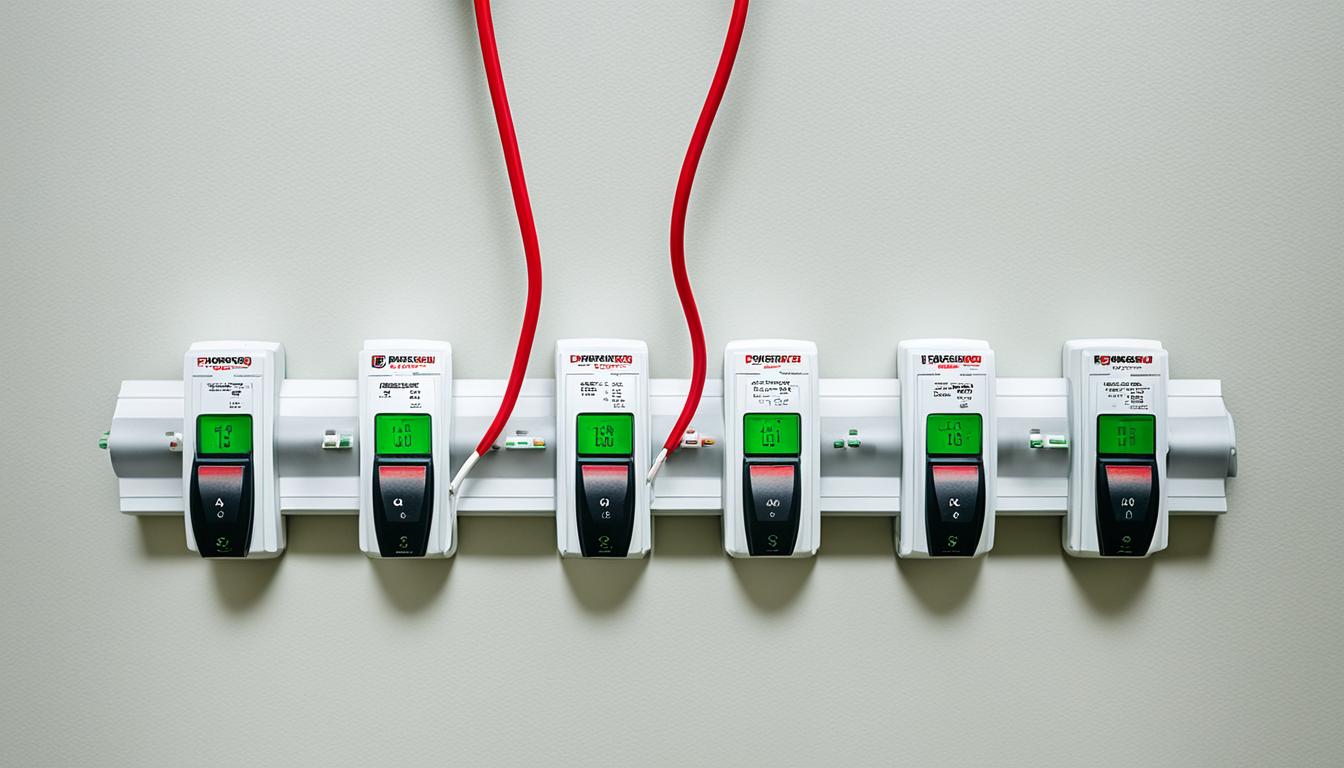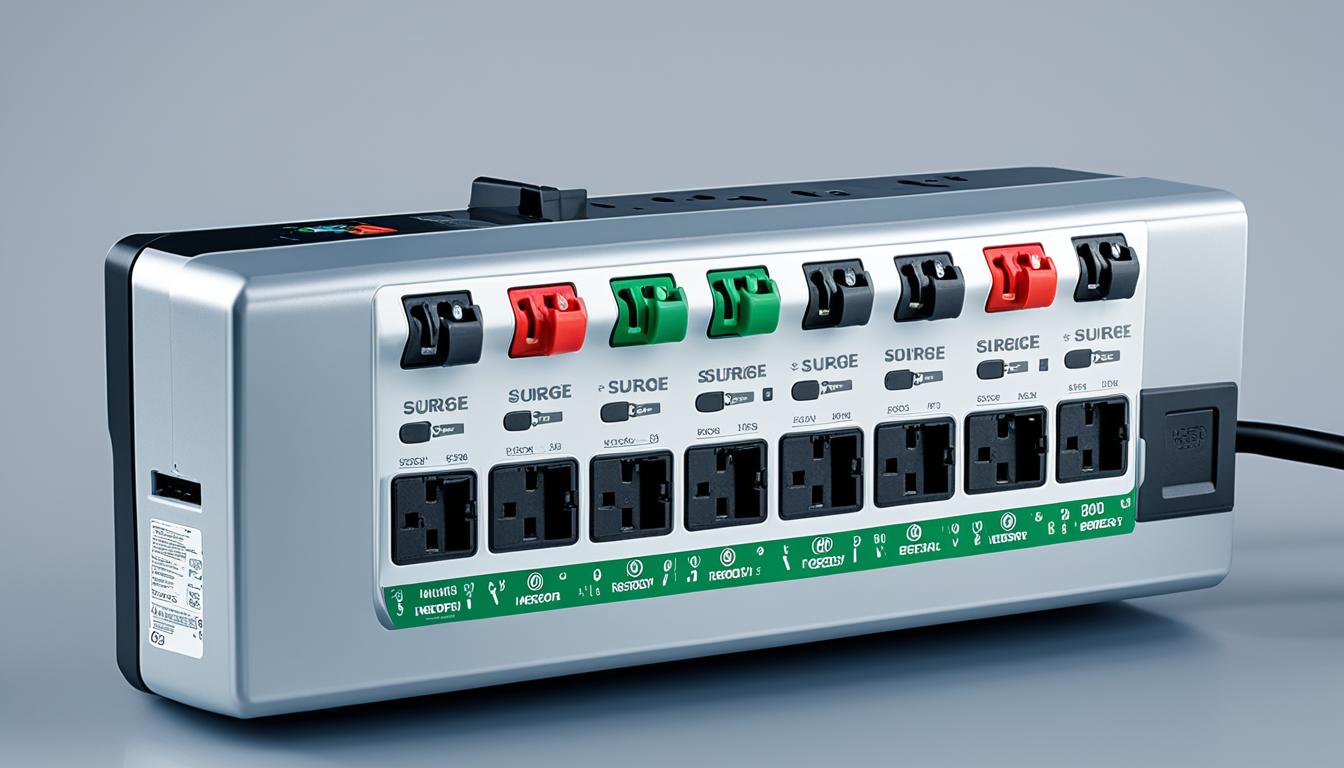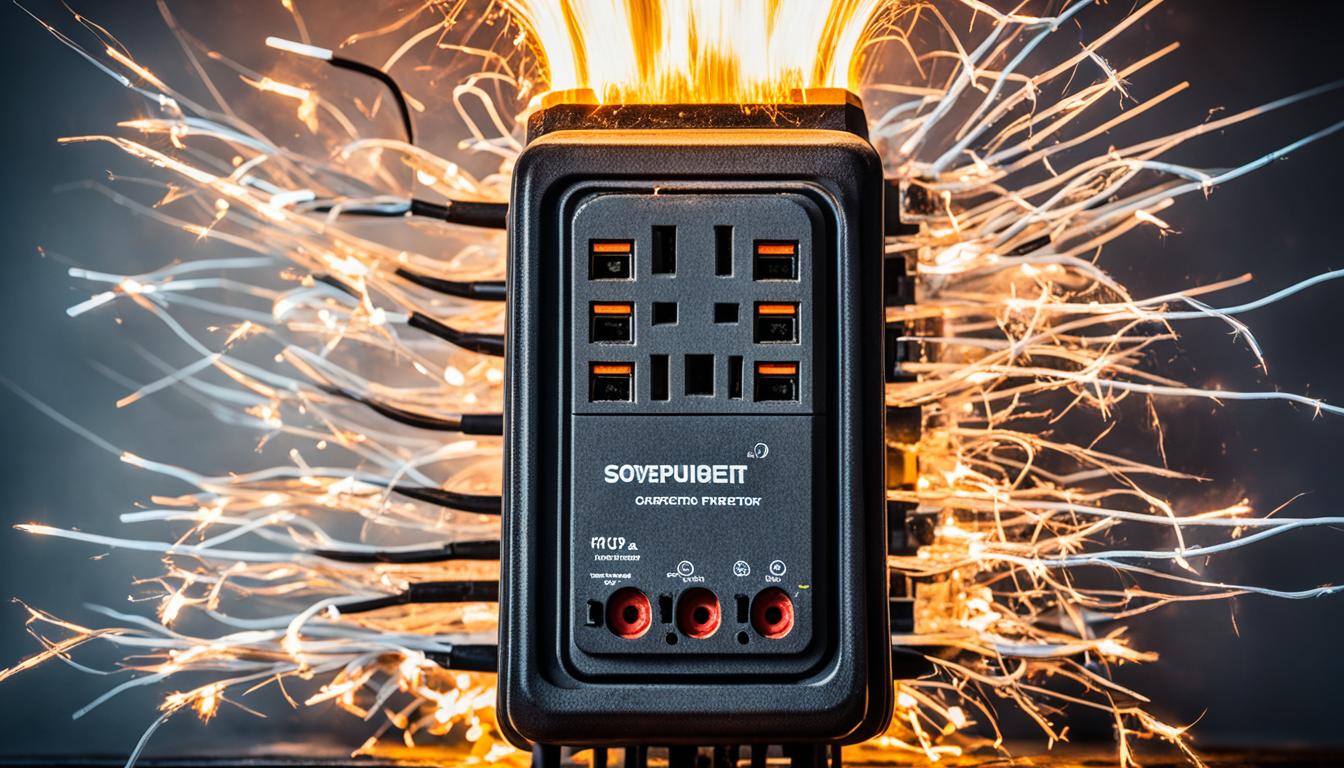The U.S. Consumer Product Safety Commission warns that using the wrong type of extension cord can be extremely dangerous. Damaged and improper use of extension cords can cause fires, leading to fatalities and injuries. To ensure safety, it is crucial to use the right kind of cord for the job.
Key Takeaways:
- Choose a durable and heavy-duty extension cord for tough jobs.
- Consider using a heavy gauge extension cord for outdoor use and heavy duty electrical equipment.
- Ensure the extension cord is of high quality and designed for heavy-duty construction.
- Check the load capacity, wire gauge, and length of the cord to match the power requirements of your devices.
- Follow safety precautions, replace damaged cords, and use extension cords according to manufacturer instructions.
Understanding Electrical Extension Cords
Electrical extension cords are essential tools that come in different types, lengths, and sizes to meet various needs. When it comes to choosing the right extension cord, it is important to consider the load capacity, wire gauge, length, and voltage drop.
Load capacity refers to the maximum amount of power an extension cord can safely handle. It is determined by two key factors – wire gauge and length. The wire gauge measures the thickness of the wire, with smaller gauge numbers indicating thicker wires. Thicker wires have higher load capacities and can handle more electrical power without overheating. The length of the cord also impacts its load capacity. Longer extension cords experience voltage drop, meaning the power diminishes over distance, leading to reduced load capacity.
It is crucial to choose the right extension cord with the appropriate wire gauge and length to ensure safe and efficient electrical usage. Using an extension cord with insufficient load capacity may result in overheating, damaged devices, or even fire hazards.
“Using an extension cord with insufficient load capacity may result in overheating, damaged devices, or even fire hazards.”
Wire Gauge and Load Capacity:
| Wire Gauge (AWG) | Maximum Load Capacity (watts) |
|---|---|
| 14 | Up to 1,375 watts |
| 12 | Up to 1,875 watts |
| 10 | Up to 3,750 watts |
To determine the appropriate extension cord, refer to the table above. For example, a 14 AWG extension cord can safely support loads up to 1,375 watts, while a 12 AWG cord can handle loads up to 1,875 watts, and a 10 AWG cord can manage up to 3,750 watts.
Remember, using the shortest extension cord possible for your needs minimizes voltage drop and maximizes load capacity. This ensures a safe and efficient power supply for your devices or appliances.
- Choose the appropriate wire gauge based on the load capacity required.
- Use the shortest extension cord that reaches your equipment.
- Avoid daisy-chaining extension cords, as it can lead to voltage drop and overload.
- Inspect extension cords regularly for any signs of damage or wear and replace them if necessary.
By understanding the importance of load capacity, wire gauge, length, and voltage drop, you can select the right electrical extension cord for your specific needs and ensure a safe and reliable power connection.
Types of Extension Cords
When it comes to extension cords, it’s crucial to choose the right type for your specific needs. Different devices require different levels of power and safety features. Let’s take a closer look at the three main types of extension cords: light-duty, medium-duty, and heavy-duty.
1. Light-Duty Extension Cords
If you’re working with light-duty electrical devices such as lamps, radios, or small electronics, a light-duty extension cord is the ideal choice. These cords are designed for low-power devices and are not grounded, meaning they do not have an additional safety grounding wire. However, they are still efficient and convenient for indoor use. Just make sure not to overload them with heavy-duty equipment.
2. Medium-Duty Extension Cords
Medium-duty extension cords are the perfect option for devices that require a bit more power, like TVs, computers, or power tools. These cords are grounded, which means they have an additional wire for safety grounding. Grounding helps prevent electrical shocks and provides an extra layer of protection, especially in situations where moisture or other hazards may be present. Choose a medium-duty extension cord for both indoor and outdoor use.
3. Heavy-Duty Extension Cords
When you’re dealing with heavy-duty tools, high-powered equipment, or heating appliances, it’s essential to use a heavy-duty extension cord. These cords are designed for maximum durability and can handle the high electrical demands of heavy-duty machinery. Like medium-duty cords, heavy-duty cords are grounded, offering optimal safety and protection. Use heavy-duty extension cords both indoors and outdoors for the most demanding jobs.
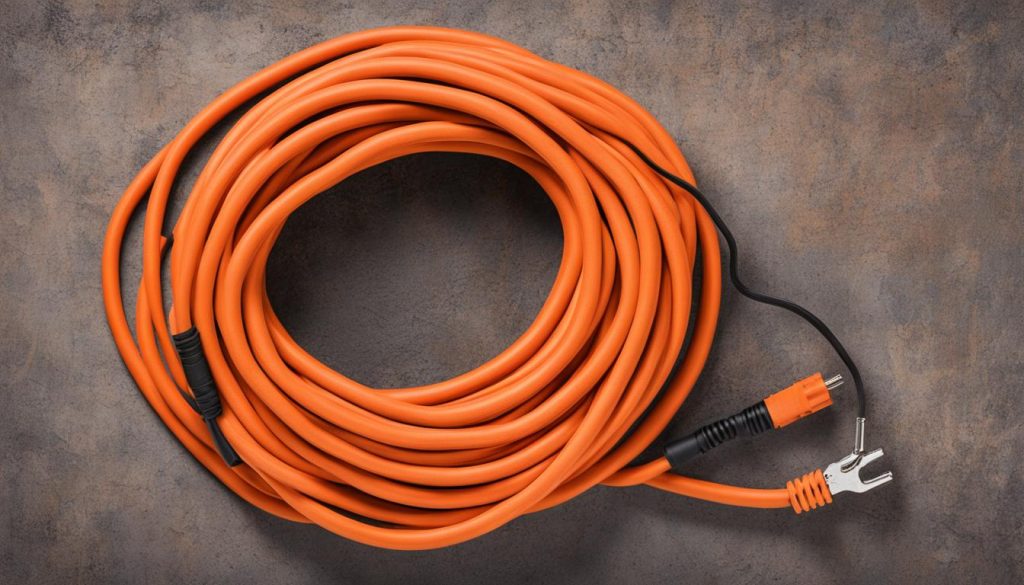
Remember, always choose the appropriate extension cord based on your power requirements. Using the wrong type of cord can not only lead to performance issues but also pose a serious safety hazard. Pay attention to the power rating and length of the cord to ensure optimal results.
Load Capacity and Wire Gauge
When it comes to using extension cords, understanding the relationship between load capacity and wire gauge is essential. The load capacity of an extension cord refers to the amount of electrical current it can safely handle without overheating or causing damage. This capacity is determined by the wire gauge, which measures the thickness of the wires inside the cord.
For heavy-duty extension cords, it is recommended to use wires with larger gauges to accommodate higher loads. Here are the recommended wire gauges for different lengths:
| Wire Gauge | Length |
|---|---|
| 14 AWG | Up to 25 feet |
| 12 AWG | Up to 50 feet |
| 10 AWG | Up to 100 feet |
By matching the appropriate wire gauge to the length of the cord, you can ensure safe and efficient use of your heavy-duty extension cords. Using a wire with too small of a gauge for a long cord can result in voltage drop, reducing the amount of power reaching the connected devices. On the other hand, using a wire with too large of a gauge for a short cord is unnecessary and can be costlier.
Remember, it is crucial to choose the right extension cord for your specific needs and to always follow the manufacturer’s instructions for safe usage.
Outdoor Use and Ground Fault Protection
When it comes to using extension cords outdoors or in areas where moisture may be present, safety should be a top priority. To ensure optimal protection and prevent potential hazards, it is crucial to consider specialized solutions designed for outdoor use or with built-in moisture protection.
Outdoor extension cords are specifically engineered to withstand the harsh outdoor conditions, including exposure to rain, snow, and UV rays. These cords are constructed with durable materials that provide extra insulation and weather resistance, making them ideal for powering tools, lights, or appliances in your backyard, garden, or construction sites.
For below-grade applications or damp areas, such as basements or garages, it is advisable to choose below-grade cords. These cords are built to withstand moisture and are designed for use in areas where water or dampness may be present.
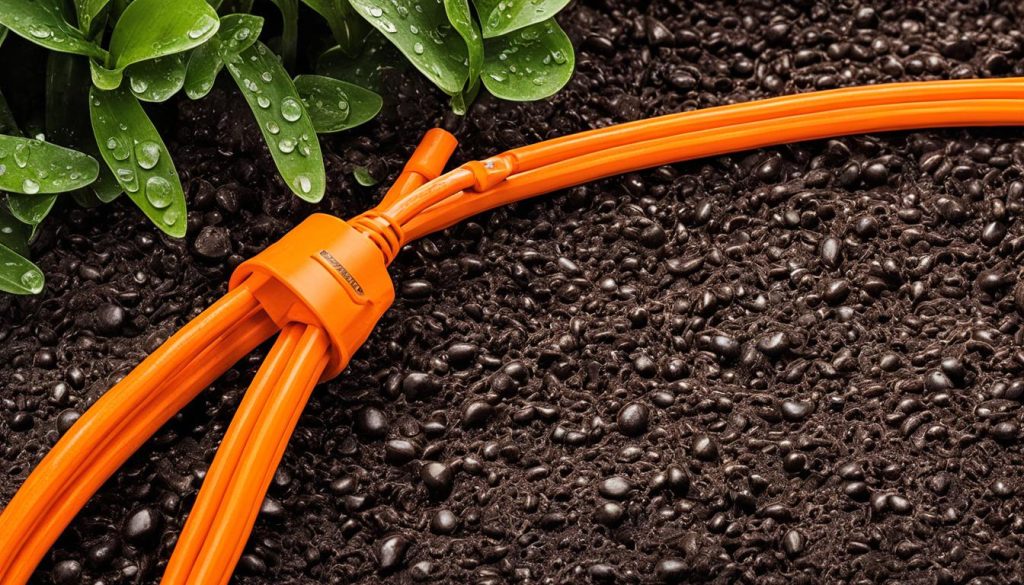
Ground Fault Circuit Interrupter (GFCI) Protection
In addition to using specialized outdoor or below-grade cords, it is essential to consider an additional safety measure – Ground Fault Circuit Interrupter (GFCI) protection. GFCIs are electrical safety devices that protect against electrical shock hazards.
When an extension cord used outdoors or in damp conditions is plugged into a GFCI-protected outlet or is a GFCI cord, it offers an extra layer of protection by instantly shutting off the circuit if a ground fault or electrical leakage is detected.
GFCI protection is especially important when using electrical devices in areas exposed to moisture, such as near pools, spas, outdoor kitchens, or during rainy weather. It significantly reduces the risk of electric shocks and safeguards against potential electrical accidents.
| Benefits of Outdoor Extension Cords and GFCI Protection |
|---|
| ● Designed for outdoor use or below-grade applications |
| ● Weather-resistant and durable materials |
| ● Reduce the risk of electrical shock hazards |
| ● Instantly shut off the circuit in case of a ground fault |
Safety Precautions and Tips
When it comes to using extension cords, your safety should always be a top priority. To ensure a safe working environment, it is essential to follow the manufacturer’s instructions regarding the use of extension cords. These instructions provide valuable guidance on how to handle and operate the cords properly.
One of the most important safety precautions is to never use a damaged extension cord. If you notice any signs of wear, fraying, or exposed wires, it is crucial to replace the cord immediately. Using a damaged cord can pose serious safety hazards and increase the risk of electric shock or fire.
It is also important to use extension cords only for their intended purpose and not exceed their load capacity. Each cord has a specific load rating, which indicates the maximum amount of electrical current it can safely handle. Exceeding this limit can lead to overheating, cable insulation breakdown, and potential fire hazards. To determine the load capacity of your extension cord, refer to the manufacturer’s specifications.
By following these safety precautions and using extension cords properly, you can minimize the risks associated with electrical accidents. Remember to always consult the manufacturer’s instructions, inspect your cords regularly, and replace any damaged cords immediately. Prioritizing extension cord safety will help ensure a safe and productive work environment.
FAQ
Can I use a heavy-duty orange extension cord for outdoor projects?
Yes, a heavy-duty orange extension cord is designed for tough jobs, including outdoor use. Its durable construction and high-quality materials make it suitable for use in various weather conditions.
What is the difference between light-duty, medium-duty, and heavy-duty extension cords?
Light-duty extension cords are suitable for light-duty electrical devices and are not grounded. Medium-duty extension cords are grounded and can be used for devices like televisions and computers. Heavy-duty extension cords, also grounded, are designed for tools and heating appliances.
How do I determine the load capacity of an extension cord?
The load capacity of an extension cord is determined by its wire gauge. For heavy-duty extension cords, a 14 AWG wire is recommended for lengths up to 25 feet, a 12 AWG wire for lengths up to 50 feet, and a 10 AWG wire for lengths up to 100 feet.
Can I use an extension cord outdoors, even in wet conditions?
Yes, but it is crucial to use extension cords that are specifically designed for outdoor use or have moisture protection. Additionally, cords used below-grade or in damp conditions should be plugged into a GFCI-protected outlet or be of the GFCI type to ensure electrical safety.
Are there any safety precautions I should take when using extension cords?
Absolutely. It is important to carefully follow manufacturer instructions regarding the use of extension cords. Never use a damaged cord and replace it immediately if it shows signs of wear or damage. Use extension cords only for their intended purpose and do not exceed their load capacity.
